The Locust Effect: Why the End of Poverty Requires the End of Violence Gary A. Haugen with Victor Boutros (Oxford University Press; 2014) $27.95 our sale price $22.35
O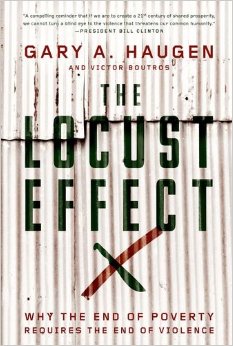 ne would be hard-pressed to suggest a more emotionally-gripping book as this new one by Gary Haugen, the State Department lawyer turned human rights activist, founder of the extraordinarily important International Justice Mission. In my estimation, it was Mr. Haugen and IJM that almost single-handedly put sexual trafficking and contemporary slavery on the radar of evangelical Christians, which, in turn, has helped make contemporary abolition work a cause celebre. IJM really did help pave the way on this, both helping cement the renaissance of social concern happening within the young evangelical world, and awakening the world at large to the stunning statistics on the prevalence of contemporary slavery. There are many other important scholars/reporters (like Kevin Bales whose writing is invaluable) and effective organizations like the Salvation Army Initiative against sexual trafficking, the respected legal aid ministry Advocates International, or Not for Sale — I hope you know their must-read, amazingly important book by David Batstone Not for Sale: The Return of the Global Slave Trade and How We Can Fight It (HarperOne; $16.99.) Alongside these and others, IJM is truly one of the preeminent faith-based human rights organizations fighting systematic evil.
ne would be hard-pressed to suggest a more emotionally-gripping book as this new one by Gary Haugen, the State Department lawyer turned human rights activist, founder of the extraordinarily important International Justice Mission. In my estimation, it was Mr. Haugen and IJM that almost single-handedly put sexual trafficking and contemporary slavery on the radar of evangelical Christians, which, in turn, has helped make contemporary abolition work a cause celebre. IJM really did help pave the way on this, both helping cement the renaissance of social concern happening within the young evangelical world, and awakening the world at large to the stunning statistics on the prevalence of contemporary slavery. There are many other important scholars/reporters (like Kevin Bales whose writing is invaluable) and effective organizations like the Salvation Army Initiative against sexual trafficking, the respected legal aid ministry Advocates International, or Not for Sale — I hope you know their must-read, amazingly important book by David Batstone Not for Sale: The Return of the Global Slave Trade and How We Can Fight It (HarperOne; $16.99.) Alongside these and others, IJM is truly one of the preeminent faith-based human rights organizations fighting systematic evil.
Those who are looking to support an organization or learn more about this dreadful scourge on the planet, IJM is very, very highly regarded. It is wonderful to see a group that is so clearly gospel-centered and rooted in the evangelical tradition that is also utterly respected as a major NGO in the global scene.
I myself first talked with Haugen many years ago — he had just come back from Rwanda and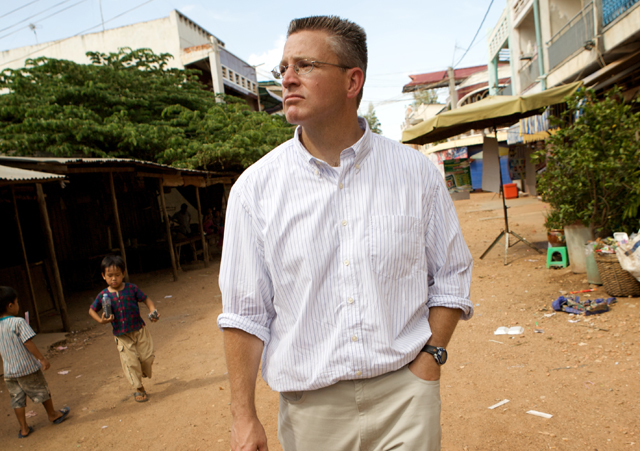 as I recall he was interested that an evangelical like me was involved with Amnesty International. I have chatted with him since and have heard him several times over the years (at an international CLS event and at our Pittsburgh Jubilee conference) and believe him to be one of the most inspired individuals I have ever met. His organization is serious, thoughtful, principled, and effective. (And — although it is a topic for another day — he brings in our friend Ruth Haley Barton for spiritual direction; the staff at his headquarters have found that being steeped in prayer and profound spiritual practices allows them to look to unwaveringly at some of the greatest evils on can behold, and survive.)
as I recall he was interested that an evangelical like me was involved with Amnesty International. I have chatted with him since and have heard him several times over the years (at an international CLS event and at our Pittsburgh Jubilee conference) and believe him to be one of the most inspired individuals I have ever met. His organization is serious, thoughtful, principled, and effective. (And — although it is a topic for another day — he brings in our friend Ruth Haley Barton for spiritual direction; the staff at his headquarters have found that being steeped in prayer and profound spiritual practices allows them to look to unwaveringly at some of the greatest evils on can behold, and survive.)
He has written three other books that are important to know about. Good News About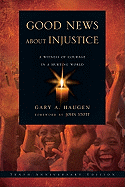 Injustice: A Witness of Courage in a Hurting World (IVP; $16.00) is a fine introduction to a public faith, being committed to the common good, and to the ways in which God’s gospel can equip us to understand and fight complex evil. It is not just a rousing call to activism, but a wise and prudent study of how to proceed in being better citizens and more aware about our world. There are good stories and it is a fine reminder that God stands against all injustices, and we should too. I like Andy Crouch’s fine comment on the 10th anniversary expanded edition that was released a few years ago: “Very few books are better after ten years than when they were first published. This is one of them. Its vision has become more relevant, compelling and, most of all, achievable than we ever could have hoped.”
Injustice: A Witness of Courage in a Hurting World (IVP; $16.00) is a fine introduction to a public faith, being committed to the common good, and to the ways in which God’s gospel can equip us to understand and fight complex evil. It is not just a rousing call to activism, but a wise and prudent study of how to proceed in being better citizens and more aware about our world. There are good stories and it is a fine reminder that God stands against all injustices, and we should too. I like Andy Crouch’s fine comment on the 10th anniversary expanded edition that was released a few years ago: “Very few books are better after ten years than when they were first published. This is one of them. Its vision has become more relevant, compelling and, most of all, achievable than we ever could have hoped.”
The second book Haugen did Terrify No More: Young Girls Held Captive and the Daring Undercover Operation to Win Their Freedom (Nelson; $14.99) is a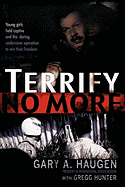 moving and dramatic portrait of some of the rescue operations IJM has done, walking alongside lawyers and humanitarians in the field as they bust up cruelly oppressive brothels. IJM’s work is always dramatic, but often it includes long and dreary litigations, conversations with police and local beurocrats, wondering why this law against child labor or that regulation about worker safety or that UN Declaration against sexual trafficking isn’t being enforced. (Indeed, this is much of what the new book is about, the biggest picture of structural and legal reform needed to protect the poor from systemic violations of the dignity.) But in this book, they showcase the occasional project of literally setting captives free by risky and dramatic intervention. Even the cover is dramatic in a gritty kind of way — and I’ve even met people whose pictures are shown inside, and who were part of the team in this op.
moving and dramatic portrait of some of the rescue operations IJM has done, walking alongside lawyers and humanitarians in the field as they bust up cruelly oppressive brothels. IJM’s work is always dramatic, but often it includes long and dreary litigations, conversations with police and local beurocrats, wondering why this law against child labor or that regulation about worker safety or that UN Declaration against sexual trafficking isn’t being enforced. (Indeed, this is much of what the new book is about, the biggest picture of structural and legal reform needed to protect the poor from systemic violations of the dignity.) But in this book, they showcase the occasional project of literally setting captives free by risky and dramatic intervention. Even the cover is dramatic in a gritty kind of way — and I’ve even met people whose pictures are shown inside, and who were part of the team in this op.
Just Courage: God’s Great Expedition for the Restless Christian (IVP; $18.00) was the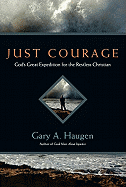 third book Haugen wrote is the one I most often recommend as it is basic, clear, and has great stories. It is a collection of talks, sermons, essays and study pieces that are exquisite, powerful, and very highly recommended. Haugen has a way of inviting those on the sidelines into the struggle, and he motivates those who care about the Bible most of all. You really should know this book, especially if you need an inspiring guide to profoundly Christian social action.
third book Haugen wrote is the one I most often recommend as it is basic, clear, and has great stories. It is a collection of talks, sermons, essays and study pieces that are exquisite, powerful, and very highly recommended. Haugen has a way of inviting those on the sidelines into the struggle, and he motivates those who care about the Bible most of all. You really should know this book, especially if you need an inspiring guide to profoundly Christian social action.
This new book, The Locust Effect: Why the End of Poverty Requires the End of Violence takes Haugen’s work to a new level, and to a new more general reading public. It is published as a major hardback by one of the world’s leading scholarly houses (Oxford University Press) As I said, it is emotional; at times it is hard to read, laden as it is with intimately told stories of injustice, rape and un-prosecuted crime. But one would also be hard-pressed to find a more urgent book, clear, informative, well-researched and very persuasive. This is a book that makes a major contribution to the discussions about global concerns, and I am very, very glad for its release.
As always, Haugen reports from his work on the front-lines against human trafficking with relentless passion and hope. But this one digs a bit deeper, explores the background cultures of the places of crisis, and makes connections that were not explicit before. This may be his most important book yet.
While some have heard him tell his story before, Haugen’s opening pages describing his grisly on-the-ground documentation of genocide in Rwanda when he worked for the United Nations special commission there is breathtaking. His stunning insight — which is the theme and purpose of this new work — began as a realization even then; namely, that all manner of anti-poverty social improvements (such as clean water or needed medicines or opportunities for economic development) can be wiped away in an instance if there is vile lawlessness. If there is not a renewed priority of establishing stable orders of human rights, sound laws and strong, fair enforcement by trained and reliable police and judges, nearly all other anti-poverty and development goals will be for naught.
The Locust Effect reads very well and is truly riveting, but there are a lot of footnotes for those who want further documentation. For over 350 pages, he tells stories, explains the details of cases, and draws exceptionally important new insights. It is nothing short of remarkable.
T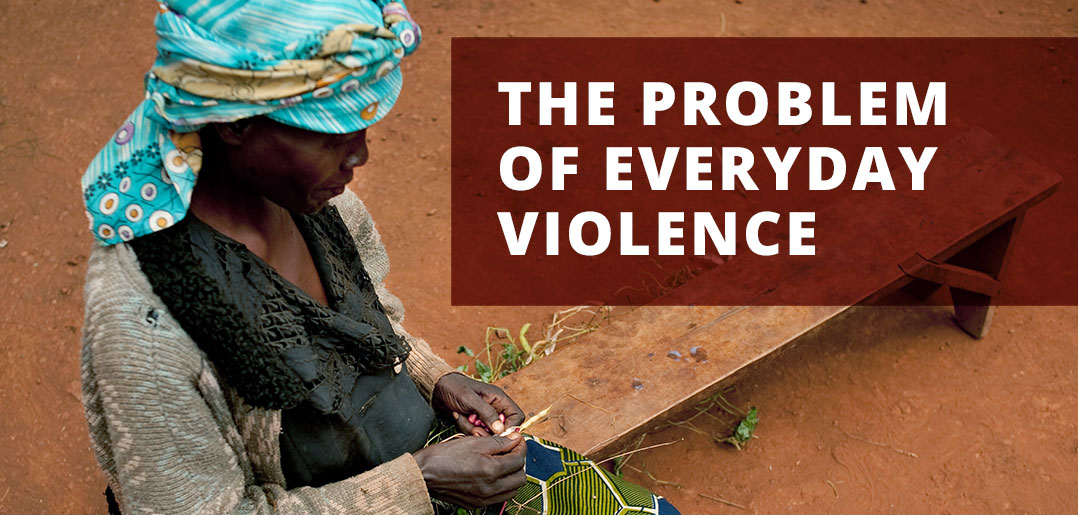 he book opens with three powerful case studies (in Peru, India and Kenya) of grotesque, systematic practices of failures to enforce laws against murder, rape, torture, and human slavery, reminding us that this global crisis is not merely occasional, nor is it abstract. Haugen’s keen ability to tell gut-wrenching stories is helpful, showing us in deeply human terms exactly what is at stake. He and his co-author, Victor Boutros, (himself an investigator and prosecutor for the Department of Justice’s Human Trafficking Prosecution Unit) teach us that this vulnerability to violence — the locust effect — is endemic to being poor. They do not mince words, insisting it is “catastrophically crushing the global poor.” The ways in which violence causes poverty is what they explain in this book. And no one on the planet could do it better.
he book opens with three powerful case studies (in Peru, India and Kenya) of grotesque, systematic practices of failures to enforce laws against murder, rape, torture, and human slavery, reminding us that this global crisis is not merely occasional, nor is it abstract. Haugen’s keen ability to tell gut-wrenching stories is helpful, showing us in deeply human terms exactly what is at stake. He and his co-author, Victor Boutros, (himself an investigator and prosecutor for the Department of Justice’s Human Trafficking Prosecution Unit) teach us that this vulnerability to violence — the locust effect — is endemic to being poor. They do not mince words, insisting it is “catastrophically crushing the global poor.” The ways in which violence causes poverty is what they explain in this book. And no one on the planet could do it better.
Haugen writes,
This plague of predatory violence is different from other problems facing the poor; and so, the remedy to the locust effect must also be different. In the lives of the poor, violence has the power to destroy everything — and is unstopped by our other responses to their poverty.
Of course other things such as hunger and disease can wipe out everything, but, mostly, the world knows this.There are global responses; we are attempting to address these other great needs by drilling wells, serving refugees, helping with crops, doing micro-financing, and such.
Interestingly, though, the near constant violation of law among the poor is hardly reported and not well understood. (Even readers who know much about economic development, world hunger, or international law will learn much from this excellent, thorough, book.) Just for instance, the esteemed “Millennium Development Goals” of the United Nations (affirmed strategically by many NGOs and world relief agencies of many church bodies) never mentions anything about the need for safety against predatory violence or the significance of the rule of law.
But how to establish justice? How to create civil society with reasonable laws, reliable police, skilled, impartial judges? How can poor villages be resourced to enforce the laws against violence that may already be on the books in their states or provinces? How can we restrain the evil configurations of the powerful who abuse the helpless?
To accomplish this, Haugen warns us, we will have to first “walk with them into the secret terror that lies beneath the surface of their poverty.”
He realizes that some of this is hard to take in. He writes,
We would ask you to decided to persevere through these first chapters as they take you, with some authentic trauma, through that darkness — because there is real hope on the other side. Later, not only will we discover together a fresh and tangible reminder from history of how diverse developing societies reversed spirals of chaotic violence and established levels of safety and order once considered unimaginable, but we will also explore a number of concrete examples of real hope emerging today, including projects from IJM and other non-governmental organizations…
It is a rare book indeed that can be so very riveting and yet so thoroughly researched, so beautifully humane and pragmatically driven, so strong on astute analysis and yet so visionary about hopeful policy reforms and proposals. The stories in The Locust Effect will captivate you, the studies of the rise of coherent criminal justice systems will fascinate you, and the copious footnotes will take you into another world of study. (Haugen and his team have truly scoured the planet for best practices of securing legal protections for the vulnerable and have an amazing grasp of the scholarly research on everything from police training to judicial reform to the legal foundations to anti-slavery efforts.)
beautifully humane and pragmatically driven, so strong on astute analysis and yet so visionary about hopeful policy reforms and proposals. The stories in The Locust Effect will captivate you, the studies of the rise of coherent criminal justice systems will fascinate you, and the copious footnotes will take you into another world of study. (Haugen and his team have truly scoured the planet for best practices of securing legal protections for the vulnerable and have an amazing grasp of the scholarly research on everything from police training to judicial reform to the legal foundations to anti-slavery efforts.)
As Moises Naim, former editor-in-chief of Foreign Policy exclaims, “This extraordinary book offers surprising and valuable insights about the nature and the drivers of the plague of violence that haunts the global poor, as well as smart ideas about how to tackle it. A must-read.”
CPJ has long proclaimed the need for strong and good laws, balancing human liberty and social justice, deeply aware of God’s desire for the common good, upheld in part by God-ordained, appropriate legal authority. Haugen takes our grand worldview and subsequent theories of a multi-dimensional view of the social order, made strong and safe by legitimate governance, and shows us why it all matters so very, very much. In some ways, this is the most important book I have read in a long time for those of us who ponder a proper view of politics, the role of the state, civil society and so forth. I don’t know if Gary reads the social theology of Abraham Kuyper (like some of us who writer for Comment and CPJ do) but this has that kind of insight, that there are various culture spheres and different social institutions that must somehow work together. The state cannot do it all, but is plays a God-given role to justly wield its God’s given sword of authority. I cannot commend it with any greater enthusiasm. Mr. Haugen and Mr. Boutros and their IJM team deserve our appreciation and, more, our support.
V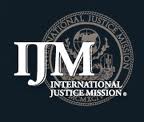 isit www.thelocusteffect.com for more information. You’ll be impressed. And come on back and order the book from us.
isit www.thelocusteffect.com for more information. You’ll be impressed. And come on back and order the book from us.
As always, we appreciate your support — as a small town indie bookstore that cares about this sort of thing, we are glad to be able to sell books like this. Sure, we are glad to encourage fun reading, we sell lots of novels and prayer books and guides to this and that, from renewing marriages to resolving local church conflict to gluten free cookbooks. You know the breadth of our interests and our untamed inventory. But when a book like The Locust Effect comes along on a prestigious publisher, with such a big and astute picture, and such moral urgency (and integrity) written in a way that has appeal to those outside the community of faith, and is such a useful work to help us learn more about the beauty and brokenness of God’s world, we are especially eager to promote it.
Yes, the world is beautiful. And yes, it is broken. Very. And this shows us what to do.
In the power of the Spirit, followers of the rightful King, the redeeming One who has come to rescue the planet from its distortions and dysfunctions, its idols and ideologies, our sin and our sin-againstness, can do important work to push back the darkness. We can all learn to care more, our hearts can be enlarged, we can buckle down and connect some dots. Haugen can help, it is as simple as that. Read this book, even if you aren’t drawn to human rights activism or third world development issues. But who know, maybe it will break your heart and move to to action, more study, or giving. The Locust Effect certainly is one of the most important books of the year.
FOUR MORE
By the way, if this prompts you to wonder about a few big things, allow us also recommend four more, each that I’ve recommended before.
U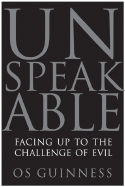 nspeakable: Facing Up to the Challenge of Evil Os Guinness (HarperOne) $14.99 Guineess is always worth reading and one of our most valued cultural critics. This is “why does God allow evil” asked in light of genocide and torture and trafficking. Os’ famous family has long been involved in abolitionist causes and he himself has lived all over the world, seeing oppression close up. (His son worked for IJM for a while, in fact.) So his learned, philosophical mind and his lucid, eloquent writing is well suited for asking this hard, complex, and painful human question about the nature of suffering, well applied for contemporary activists. This is an important book, moving and interesting and urgent. It is very highly recommended for those needing to ponder the very deepest questions behind Haugen’s vivid and passionate book.
nspeakable: Facing Up to the Challenge of Evil Os Guinness (HarperOne) $14.99 Guineess is always worth reading and one of our most valued cultural critics. This is “why does God allow evil” asked in light of genocide and torture and trafficking. Os’ famous family has long been involved in abolitionist causes and he himself has lived all over the world, seeing oppression close up. (His son worked for IJM for a while, in fact.) So his learned, philosophical mind and his lucid, eloquent writing is well suited for asking this hard, complex, and painful human question about the nature of suffering, well applied for contemporary activists. This is an important book, moving and interesting and urgent. It is very highly recommended for those needing to ponder the very deepest questions behind Haugen’s vivid and passionate book.
T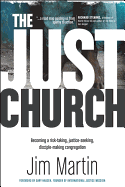 he Just Church: Becoming a Risk-Taking, Justice-Seeking, Disciple-Making Congregation Jim Martin (Tyndale/Momentum) $14.99 Want to get your own congregation more involved in thinking about social justice, even fighting systemic evil of this sort? Jim is the director of church relations for IJM and this is an amazing book — really, really good, visionary and practical, helping overcome obstacles of instituting more viable options for local church concern and involvement. Regardless of your denomination, this is, I believe, the best handbook I’ve yet seen exploring this kind of ministry, making sure that justice work isn’t marginalizes or seen as a fad or interest of the few, but a central part of the basic formation and disciple-making process of the church. The author is evangelical and the book is especially helpful for those whose vision is gospel-centered and perhaps skeptical of taking on big, political concerns…
he Just Church: Becoming a Risk-Taking, Justice-Seeking, Disciple-Making Congregation Jim Martin (Tyndale/Momentum) $14.99 Want to get your own congregation more involved in thinking about social justice, even fighting systemic evil of this sort? Jim is the director of church relations for IJM and this is an amazing book — really, really good, visionary and practical, helping overcome obstacles of instituting more viable options for local church concern and involvement. Regardless of your denomination, this is, I believe, the best handbook I’ve yet seen exploring this kind of ministry, making sure that justice work isn’t marginalizes or seen as a fad or interest of the few, but a central part of the basic formation and disciple-making process of the church. The author is evangelical and the book is especially helpful for those whose vision is gospel-centered and perhaps skeptical of taking on big, political concerns…
D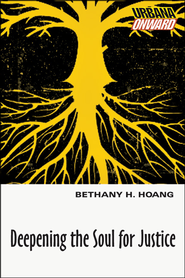 eepening the Soul for Justice Bethany H. Hoang (IVP) $5.00 Bethany Hoang (who is speaking on the main stage at the CCO Jubilee conference this year) has worked for IJM for years, and this small booklet is a powerhouse of a resource, wonderfully written, calling us to make prayerfulness a central part of our justice work, and social justice concerns a central part of our prayer lives. It is a theme I noted above, that IJM values. She insists that engaging in spiritual formation practices are part of how we sustain robust discipleship in the world, amidst all its hurt and heavy demands. She and her IJM colleagues should know. This is a beautiful little book, inspiring, thoughtful, and helpful, allowing us to deepen our souls, and connect the journey inward to God’s missional work in the world.
eepening the Soul for Justice Bethany H. Hoang (IVP) $5.00 Bethany Hoang (who is speaking on the main stage at the CCO Jubilee conference this year) has worked for IJM for years, and this small booklet is a powerhouse of a resource, wonderfully written, calling us to make prayerfulness a central part of our justice work, and social justice concerns a central part of our prayer lives. It is a theme I noted above, that IJM values. She insists that engaging in spiritual formation practices are part of how we sustain robust discipleship in the world, amidst all its hurt and heavy demands. She and her IJM colleagues should know. This is a beautiful little book, inspiring, thoughtful, and helpful, allowing us to deepen our souls, and connect the journey inward to God’s missional work in the world.
Listen carefully to what Skye Jethani wisely writes about it:
Let’s be honest. Trends dominate the contemporary church, but some ideas are too important to succumb to the here-today-gone-tomorrow nature of consumer religion. Justice is one of them. Bethany Hoang recognizes the need to anchor justice to a foundation of theology, Scripture, and communion with God if it is to avoid becoming another disposable trend among Christians. This book is a critical beginning for anyone serious about seeking justice for a lifetime.
R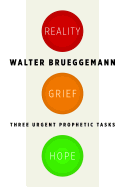 eality Grief Hope: Three Urgent Prophetic Tasks Walter Brueggemann (Eerdmans) $15.00 I will need to review this more carefully soon, but for now, I wanted to recommend this for anyone who is struggling with these great burdens of caring about the world, about the needs of our neighbors, about the seemingly intransigence and complexity of the issues of our time and who wants a thick, richly consider Biblical rumination about it all. How do we face reality and not cover up the pain and brokenness? What is the role of lament, sharing grief, naming our pains and losses and fears? And can hope emerge from that? Is there a connection between the tragedy of Jewish exile in 587 BC and our 21st century dislocations? How do we imagine all this? I am not sure if Walt wrote this as a long-awaited sequel to the seminal, dense, generative work he did decades ago in The Prophetic Imagination and The Hopeful Imagination, but it sure seems like it to me. Those two books are among my all time favorites, and I cannot underestimate how they have shaped and sustained me. This brand new book is heading to the top of my stack, and I thought you should know of it — perhaps to read alongside Gary Haugen.
eality Grief Hope: Three Urgent Prophetic Tasks Walter Brueggemann (Eerdmans) $15.00 I will need to review this more carefully soon, but for now, I wanted to recommend this for anyone who is struggling with these great burdens of caring about the world, about the needs of our neighbors, about the seemingly intransigence and complexity of the issues of our time and who wants a thick, richly consider Biblical rumination about it all. How do we face reality and not cover up the pain and brokenness? What is the role of lament, sharing grief, naming our pains and losses and fears? And can hope emerge from that? Is there a connection between the tragedy of Jewish exile in 587 BC and our 21st century dislocations? How do we imagine all this? I am not sure if Walt wrote this as a long-awaited sequel to the seminal, dense, generative work he did decades ago in The Prophetic Imagination and The Hopeful Imagination, but it sure seems like it to me. Those two books are among my all time favorites, and I cannot underestimate how they have shaped and sustained me. This brand new book is heading to the top of my stack, and I thought you should know of it — perhaps to read alongside Gary Haugen.
As Stanley Hauerwas notes,
It is one thing to call for a prophetic imagination, it is quiet another matter to actually have a prophetic imagination. This book clearly shows Brueggemann to have the ‘unrelenting realism’ that possessed the imagination of the ancient prophets… With steely eyed observation he helps us see, amid the despair that has gripped American life [since 9-11] that this is hope — a hope grounded in the everyday work of the church. This is Brueggemann at his very best.
BookNotesSPECIAL
DISCOUNT
ANY ITEM MENTIONED
20% off
order here
takes you to the secure Hearts & Minds order form page
just tell us what you wantinquire here
if you have questions or need more information
just ask us what you want to knowHearts & Minds 234 East Main Street Dallastown, PA 17313 717-246-3333
read@heartsandmindsbooks.com
